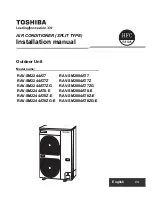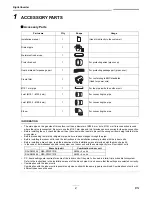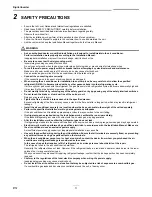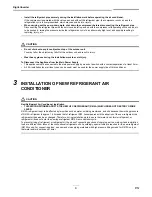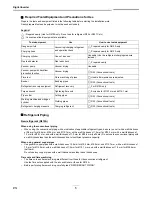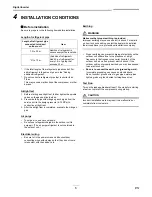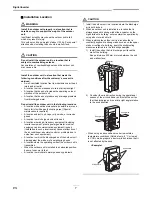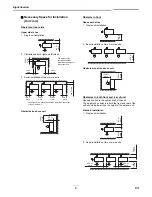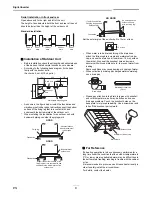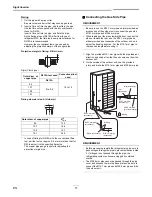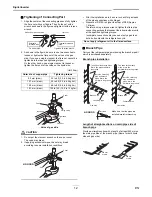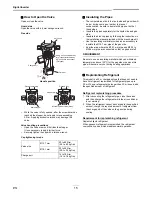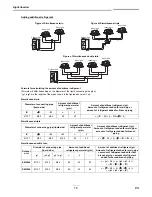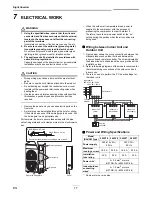
EN
3
Digital Inverter
2
SAFETY PRECAUTIONS
•
Ensure that all Local, National and International regulations are satisfied.
•
Read these “SAFETY PRECAUTIONS” carefully before installation.
•
The precautions described below include important items regarding safety.
Observe them without fail.
•
After the installation work, perform a trial operation to check for any problem.
Follow the Owner’s Manual to explain to the customer how to use and maintain the unit.
•
Ask the customer to keep the Installation Manual together with the Owner’s Manual.
WARNING
•
Ask an authorized dealer or qualified installation professional to install/maintain the air conditioner.
Perform installation work properly according to the Installation Manual.
Inappropriate installation may result in water leakage, electric shock or fire.
•
Be sure to connect earth wire (grounding work).
Incomplete grounding cause an electric shock.
Do not connect ground wires to gas pipes, water pipes, lightning rods or ground wires for telephone wires.
•
Turn off the main power supply switch or breaker before attempting any electrical work and maintenance.
Make sure all power switches are off. Failure to do so may cause electric shock.
Use an exclusive power circuit for the air conditioner. Use the rated voltage.
•
Connect the connecting wire correctly.
If the connecting wire is incorrect, electric parts may be damaged.
•
When moving the air conditioner for installation to another place, be very careful not to allow the specified
refrigerant (R410A) to become mixed with any other gaseous body into the refrigeration cycle.
If air or any other gas mixes with the refrigerant, the gas pressure in the refrigeration cycle will become abnormally high and
it may result in the pipe bursting or personal injuries.
•
Do not modify this unit by removing any of the safety guards or by by-passing any of the safety interlock switches.
•
Do not touch the intake or aluminum fins of the outdoor unit.
Doing so may result in injury.
•
Tighten the flare nut with a torque wrench in the specified manner.
Excessive tightening of the flare nut may cause a crack in the flare nut after a long period, which may result in refrigerant
leakage.
•
Install the air conditioner securely in a location where the base can sustain the weight of the unit adequately.
•
Perform the specified installation work to guard against an earthquake.
If the air conditioner is not installed appropriately, accidents may occur due to the unit falling.
•
If refrigerant gas has leaked during the installation work, ventilate the room immediately.
If the leaked refrigerant gas comes in contact with fire, noxious gas may be generated.
•
After the installation work, confirm that refrigerant gas does not leak.
If refrigerant gas leaks into the room and flows near a fire source, such as a cooking range, noxious gas may be generated.
•
Electrical work must be performed by a qualified electrician in accordance with the Installation Manual. Make sure
the air conditioner uses an exclusive power supply.
An insufficient power supply capacity or inappropriate installation may cause fire.
•
Use only the specified wiring during the unit installation. Ensure that all terminals are securely fixed, so preventing
any external forces having a negative effect on the terminals.
•
When the air conditioner cannot cool or heat a room well, contact the dealer from whom you purchased the air
conditioner as refrigerant leakage is considered as the cause.
In the case of repair that requires refill of refrigerant, ask service personnel about details of the repair.
The refrigerant used in the air conditioner is harmless.
Generally, the refrigerant does not leak. However, if the refrigerant leaks in a room and a heater or stove burner in the room
catches fire, it may generate toxic gas.
When you ask service personnel for repairing refrigerant leakage, confirm that the leakage portion has been completely
repaired.
•
Conform to the regulations of the local electric company when wiring the power supply.
Inappropriate grounding may cause electric shock.
•
Do not install the air conditioner in a location that may be subjected to a risk of exposure to a combustible gas.
If a combustible gas leaks and becomes concentrated around the unit, a fire may occur.

